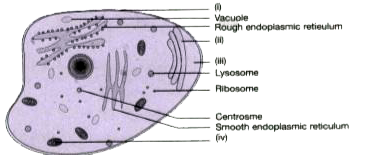What are the functions of lysosomes?
Step-by-Step Solution:
1. Definition of Lysosomes:
- Lysosomes are membrane-bound organelles found in the cytoplasm of eukaryotic cells. They are often referred to as "digestive bags" due to their role in breaking down waste materials and cellular debris.
2. Extracellular Digestion:
- One of the primary functions of lysosomes is to facilitate extracellular digestion. The enzymes contained within lysosomes can be released outside the cell to break down extracellular materials. This process helps in the degradation of substances that are outside the cell.
3. Digestion of Foreign Particles:
- Lysosomes are crucial in the immune response as they digest foreign particles, such as bacteria and viruses, that invade the cell. The enzymes within lysosomes can effectively break down these pathogens, helping to protect the body from infections.
4. Cellular Digestion:
- Lysosomes also play a vital role in cellular digestion. They release their enzymes to digest damaged or old cellular components. This process is essential for cellular maintenance and recycling of cellular materials, ensuring that cells remain healthy and functional.
5. Summary of Functions:
- In summary, the functions of lysosomes include:
- Extracellular digestion of materials.
- Digestion of foreign particles (pathogens).
- Cellular digestion of damaged or obsolete cellular components.
- Lysosomes are membrane-bound organelles found in the cytoplasm of eukaryotic cells. They are often referred to as "digestive bags" due to their role in breaking down waste materials and cellular debris.
- One of the primary functions of lysosomes is to facilitate extracellular digestion. The enzymes contained within lysosomes can be released outside the cell to break down extracellular materials. This process helps in the degradation of substances that are outside the cell.
- Lysosomes are crucial in the immune response as they digest foreign particles, such as bacteria and viruses, that invade the cell. The enzymes within lysosomes can effectively break down these pathogens, helping to protect the body from infections.
- Lysosomes also play a vital role in cellular digestion. They release their enzymes to digest damaged or old cellular components. This process is essential for cellular maintenance and recycling of cellular materials, ensuring that cells remain healthy and functional.
- In summary, the functions of lysosomes include:
- Extracellular digestion of materials.
- Digestion of foreign particles (pathogens).
- Cellular digestion of damaged or obsolete cellular components.
Topper's Solved these Questions
- CELL-THE FUNDAMENTAL UNIT OF LIFEBOOK - MTG IIT JEE FOUNDATIONCHAPTER - CELL-THE FUNDAMENTAL UNIT OF LIFEEXERCISE - EXERCISE ( Subjective Questions ) (Long Answer Type )
11 Videos
- CELL-THE FUNDAMENTAL UNIT OF LIFEBOOK - MTG IIT JEE FOUNDATIONCHAPTER - CELL-THE FUNDAMENTAL UNIT OF LIFEEXERCISE - OLYMPIAD/HOTS CORNER
12 Videos
- CELL-THE FUNDAMENTAL UNIT OF LIFEBOOK - MTG IIT JEE FOUNDATIONCHAPTER - CELL-THE FUNDAMENTAL UNIT OF LIFEEXERCISE - EXERCISE ( Subjective Questions ) (Very Short Answer Type )
15 Videos
- DIVERSITY IN LIVING ORGANISMSBOOK - MTG IIT JEE FOUNDATIONCHAPTER - DIVERSITY IN LIVING ORGANISMSEXERCISE - OLYMPIAD/HOTS CORNER
12 Videos
Similar Questions
Knowledge Check
Function of lysosome is
ABreakdown of cell substancesBSynthesis of proteinsCPhotosynthesisDBreakdown of waterFunction of lysosome is
AProtein synthesisBProcessing and packagingCIntracellular digestionDSynthesis of fatMain function of lysosomes is
ASecretionBRespirationCExtracellular digestionDIntracellular digestion

